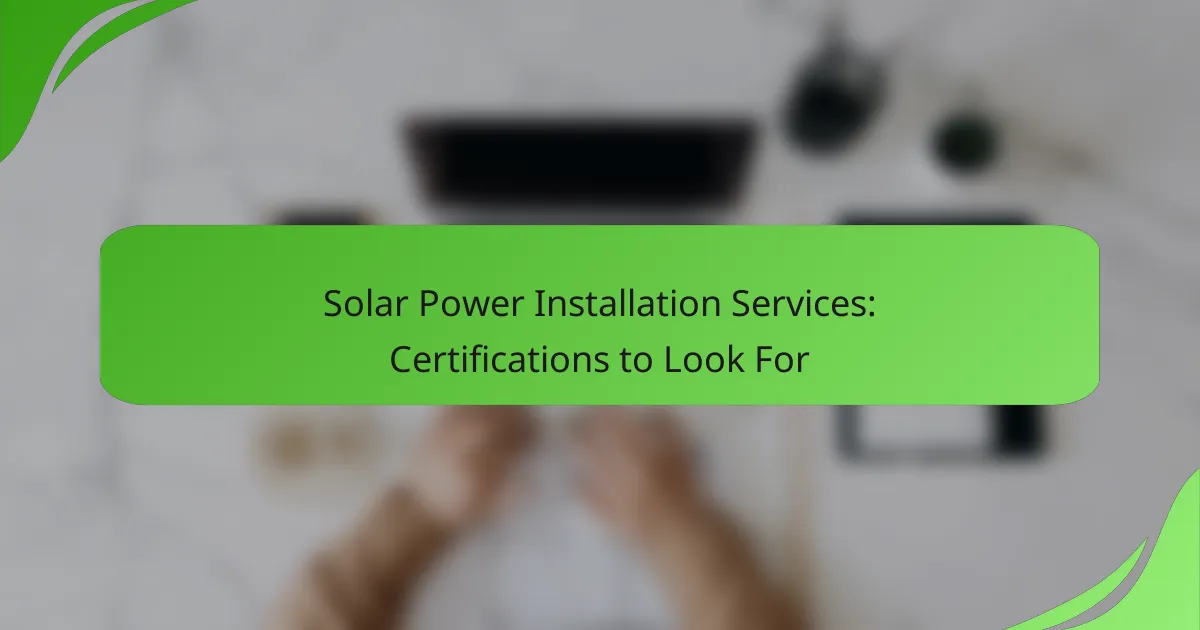When choosing solar power installation services, it’s essential to look for certifications that reflect industry expertise and compliance with standards. Certifications such as NABCEP and ISO 9001 not only ensure quality and reliability but also enhance the performance and safety of solar systems. Hiring certified installers can provide additional benefits, including access to state incentives and a deeper understanding of local regulations, ultimately maximizing your investment in solar energy.

What certifications should you look for in solar power installation services?
When selecting solar power installation services, look for certifications that demonstrate expertise and adherence to industry standards. Key certifications include NABCEP, ISO 9001, and compliance with state licensing requirements, which ensure quality and reliability in solar installations.
NABCEP Certification
The North American Board of Certified Energy Practitioners (NABCEP) certification is a widely recognized credential in the solar industry. It signifies that the installer has met rigorous standards of knowledge and experience in solar energy systems.
Choosing a NABCEP-certified installer can provide peace of mind, as these professionals are trained in best practices and safety protocols. Look for installers with NABCEP certifications specific to photovoltaic (PV) systems or solar heating.
ISO 9001 Certification
ISO 9001 certification indicates that a company adheres to quality management principles, ensuring consistent quality in products and services. For solar installation services, this certification reflects a commitment to customer satisfaction and continuous improvement.
When evaluating installers, check if they have ISO 9001 certification, as it can be a sign of a well-organized company that prioritizes quality control. This can lead to fewer installation issues and better overall service.
State Licensing Requirements
State licensing requirements for solar installers vary significantly across the United States. Many states require specific licenses or certifications to ensure that installers meet local regulations and safety standards.
Before hiring a solar installation service, verify that they hold the necessary state licenses. This can include general contractor licenses or specialized solar installation licenses, depending on your state’s laws. Ensuring compliance with local regulations can help avoid legal issues and ensure a safe installation process.

How do certifications impact solar power installation quality?
Certifications significantly influence the quality of solar power installations by ensuring that installers meet established industry standards and practices. They provide a framework for assessing the competence and reliability of installation services, which can lead to better performance and safety of solar systems.
Ensures adherence to industry standards
Certifications require solar power installers to comply with specific industry standards, which can include safety protocols, installation techniques, and equipment quality. For instance, certifications from organizations like the North American Board of Certified Energy Practitioners (NABCEP) ensure that installers are knowledgeable about best practices and current technologies.
When hiring a certified installer, you can expect adherence to local regulations and codes, which can vary by region. This compliance helps prevent issues such as improper installations that could lead to system failures or safety hazards.
Enhances consumer trust
Having certifications enhances consumer trust in solar power installation services. Customers are more likely to choose certified installers because these credentials indicate a commitment to professionalism and quality. This trust can be crucial in a market where consumers may be unfamiliar with solar technology.
Moreover, certified installers often provide warranties and guarantees that reflect their confidence in their work. This added assurance can help consumers feel more secure in their investment, knowing that they are working with qualified professionals who prioritize quality and safety.

What are the benefits of hiring certified solar installers in California?
Hiring certified solar installers in California offers numerous advantages, including access to state incentives and assurance of high-quality installation. Certified professionals are knowledgeable about local regulations and can help maximize your investment in solar energy.
Access to state incentives
Certified solar installers in California can guide you through various state incentives that can significantly reduce installation costs. These incentives may include tax credits, rebates, and performance-based incentives that are only available through licensed contractors.
For instance, California’s Solar Investment Tax Credit (ITC) allows homeowners to deduct a percentage of their solar installation costs from their federal taxes. Additionally, local utility companies often provide rebates for solar installations, which certified installers can help you access.
Higher installation quality
Choosing certified solar installers ensures that your system is installed according to industry standards, which leads to better performance and longevity. Certified professionals have undergone rigorous training and are familiar with the latest technologies and best practices in solar installation.
High-quality installation can prevent common issues such as leaks or system failures, which can be costly to repair. Moreover, certified installers often provide warranties on their work, giving you peace of mind that your investment is protected.

How to verify the certifications of solar installation companies?
To verify the certifications of solar installation companies, start by checking their credentials against recognized certification bodies. This ensures that the installers meet industry standards and have the necessary expertise to perform quality work.
Check official certification bodies
Official certification bodies, such as the North American Board of Certified Energy Practitioners (NABCEP) in the U.S. or the Renewable Energy Association (REA) in the UK, provide a reliable source for verifying installer credentials. These organizations set rigorous standards and conduct assessments to ensure that certified professionals are knowledgeable and competent.
When evaluating a company, look for certifications relevant to your region and project type. For instance, NABCEP certifications are highly regarded in the U.S., while in Europe, certifications like the EN 45011 can indicate compliance with European standards.
Request documentation from installers
Always request documentation from solar installation companies to confirm their certifications. This can include copies of their certification, insurance, and any relevant licenses. A reputable installer should be willing to provide this information without hesitation.
In addition to certifications, ask about their experience and any warranties they offer. A solid warranty can indicate confidence in their work and provide you with peace of mind regarding the longevity of your solar system.

What are the prerequisites for solar installation certifications?
To obtain solar installation certifications, candidates typically need to complete specific training programs and gain relevant field experience. These prerequisites ensure that installers are knowledgeable about solar technology and can effectively implement safe and efficient installations.
Training programs completion
Completing an accredited training program is essential for aspiring solar installers. These programs often cover topics such as solar energy principles, system design, installation techniques, and safety protocols. Many institutions offer courses that can range from a few weeks to several months, depending on the depth of training.
Look for programs that are recognized by industry standards, such as those accredited by the North American Board of Certified Energy Practitioners (NABCEP) or similar organizations. Completing these programs not only provides foundational knowledge but also enhances credibility in the job market.
Field experience requirements
Field experience is a critical component of solar installation certifications. Most certification bodies require candidates to have hands-on experience, typically ranging from several hundred to a few thousand hours, depending on the certification level. This practical experience helps installers understand real-world challenges and solutions in solar system installations.
To gain this experience, consider working as an apprentice under a licensed solar installer or participating in internships with solar companies. This on-the-job training is invaluable and often a prerequisite for taking certification exams, ensuring that candidates are well-prepared for the demands of the industry.

What are the emerging trends in solar installation certifications?
Emerging trends in solar installation certifications focus on enhancing sustainability, integrating advanced technologies, and prioritizing consumer education. These trends reflect the industry’s evolution towards more efficient and environmentally friendly practices, ensuring that installers meet modern standards.
Increased emphasis on sustainability
The solar industry is increasingly prioritizing sustainability in its certification processes. Installers are now encouraged to adopt practices that minimize environmental impact, such as using eco-friendly materials and implementing energy-efficient systems.
For example, certifications may require the use of solar panels with high recyclability rates or the adoption of installation methods that reduce waste. This shift not only benefits the environment but also appeals to consumers who are more environmentally conscious.
Integration of new technologies
New technologies are becoming integral to solar installation certifications, reflecting advancements in the field. Installers are now expected to be knowledgeable about smart solar systems, energy storage solutions, and grid integration technologies.
Certifications may include training on the latest software for monitoring energy production or tools for optimizing system performance. This ensures that installers can provide cutting-edge solutions that enhance efficiency and reliability for customers.
Focus on consumer education
There is a growing emphasis on consumer education within solar installation certifications. Installers are encouraged to not only install systems but also to educate clients about their solar options, system maintenance, and energy savings.
Effective communication can help consumers make informed decisions, leading to higher satisfaction and better long-term outcomes. Installers who excel in educating their clients often see increased referrals and repeat business, making this a crucial aspect of their service.
